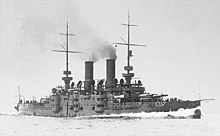Habsburg-class battleship

A ship of the Habsburg class
|
|
| Class overview | |
|---|---|
| Name: | Habsburg class |
| Operators: |
|
| Succeeded by: | Erzherzog Karl class |
| In commission: | 1900–1921 |
| Completed: | 3 |
| Scrapped: | 3 |
| General characteristics | |
| Type: | Pre-dreadnought battleship |
| Displacement: |
|
| Length: | 375 ft 10 in (114.6 m) |
| Beam: | 65 ft (19.8 m) |
| Draft: | 24 ft 6 in (7.5 m) |
| Installed power: | 15,063 ihp (11,232 kW) |
| Propulsion: |
|
| Speed: | 19 knots (35 km/h; 22 mph) |
| Complement: | 638 |
| Armament: |
|
| Armor: |
|
The Habsburg class was a group of pre-dreadnought battleships built by Austria-Hungary at the turn of the 20th century. They were the first sea-going battleship built by Austria-Hungary since the center-battery ship Tegetthoff in 1876. The class was composed of three ships: Habsburg, Árpád, and Babenberg. They were armed with three 24 cm (9.4 in) guns in two turrets and were capable of slightly better than 19.5 knots (36.1 km/h; 22.4 mph) at full speed. Habsburg and Árpád were modernized in 1910–11.
Habsburg was launched on 9 September 1900, Árpád just over a year later on 11 September 1901, and Babenberg on 4 October 1902. The ships saw limited service during World War I in the IV Division of the Austro-Hungarian fleet. Babenberg and Árpád bombarded the Italian port of Ancona in 1915, but the three battleships were largely inactive for the remainder of their service. They were decommissioned in 1916 to free up the majority of their crews for service in the submarine and air forces. All three ships were ultimately ceded to Great Britain following the end of the war; they were sold to Italian ship-breakers and scrapped in 1921.
The ships of the Habsburg class were 113.11 m (371 ft) long at the waterline and 114.55 m (375 ft 10 in) long overall. They had a beam of 19.8 m (65 ft) and a draft of 7.5 m (24 ft 6 in).Freeboard was approximately 5.80 m (19.0 ft) forward and about 5.50 m (18.0 ft) aft. They displaced 8,364 metric tons (8,232 long tons). The ships had a crew of 638 officers and enlisted men. The ships had a flush main deck that was planked with wood, while the upper decks were covered with linoleum or corticine.
...
Wikipedia
